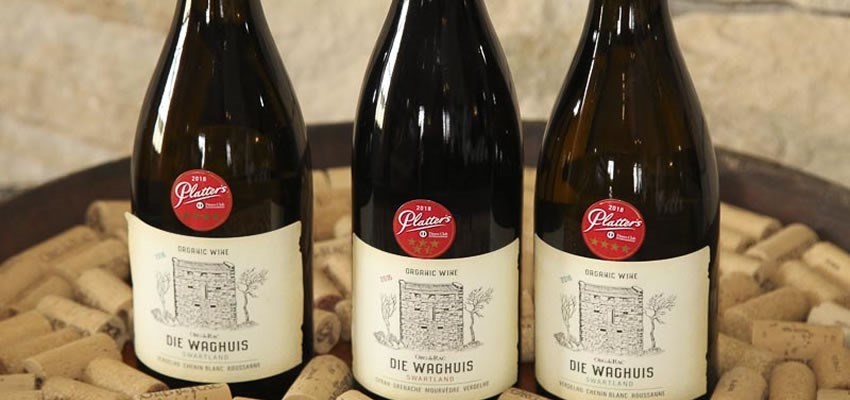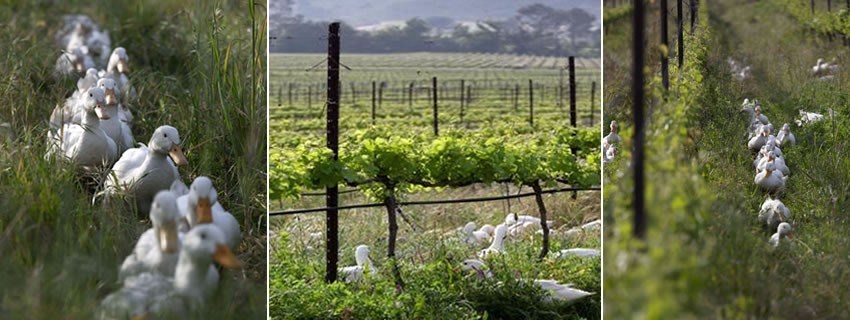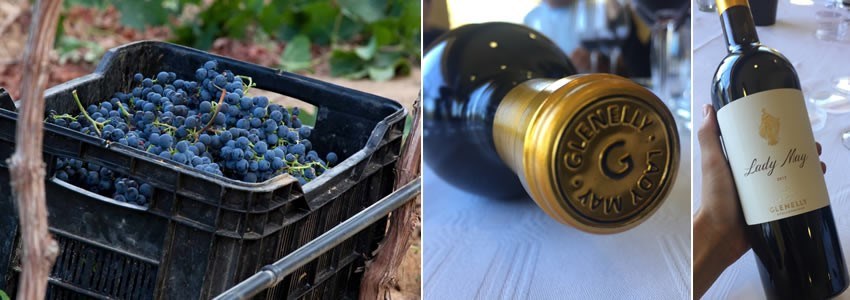“We say we’re organic but it’s an add-on. We’ve got to be as good as conventional wine”. Frank Meaker, cellar master at Org De Rac in the Swartland, is passionate about environmentally-friendly, sustainable, organic viticulture. Walking through the dusty vineyards perched on a hillside above Piketberg, we overlook the dry stubble and red earth of a sea of wheat fields. “Hot and dry conditions in South Africa make us suited to organic farming” says the veteran of forty vintages in France, the US and South Africa. “It’s all about balance and diversity in the vineyard and the cellar, whether you are organic or not”.
One of the biggest certified wine producers in South Africa, Org de Rac is one of a dozen pioneering organic wine farms in the Western Cape, ranging from Stellar Winery (the biggest) to Avondale, Earthbound, Laibach, Lazanou, Reyneke, Waverley Hills and Waterkloof. The whole organic chain of production from vineyard to the cellar, is meticulously managed at Org de Rac. Meaker has an earthy, holistic philosophy from the use of wasps to control pests, low concentration copper sprays, guano (“Bird shit is high in nitrogen” he adds) as natural fertiliser, organic sugar to make their highly-rated Blanc de Blancs MCC, wild yeast, slow ferments and organic egg fining powder in the cellar.

Photo: The Wine Taster
“We get the healthiest grapes I’ve ever seen … the great colour and fruit shows in the wines” he declares on our walk through a vineyard planted with six clones of Merlot which go into one of their most awarded wines. “We’re farming like we did before the second world war before the use of chemical fertilisers, herbicides and pesticides”. Meaker, grandson of legendary wine farmer Paul Sauer of Kanonkop, has wine in his blood. “South Africa is slow on organics. Organic is the future for the new generation of wine consumers. Our main market is Sweden which is one-third organic”.
Dryland wine regions like the Swartland are under stress. At Org de Rac they started increasing the water table sourced from the Berg River which runs through the farm and nearby dams last August already – as well as using probes to micro-manage the driest vineyard pockets and reduce water use by 40%. “You can’t farm vines without water. Heat is the number one enemy of the SA wine industry. The vine must ripen the grapes not the sun” says Meaker as he unzips a giant seal on the stairway leading to an underground barrel cellar where humidity sprays control the temperature.
The cellar master proudly shows the result over a tasting of the superb new Roussanne, white (Verdelho, Chenin Blanc and Roussanne) and red (Shiraz, Grenache and Mourvedre) flagship blends under Die Waghuis label and reserve Merlot, Cabernet and Shiraz. “I believe in blends as the future. The world is getting tired of single varieties. You have to plant what is suited to the terroir. Organic fruit is more open and expressive. The market wants wines with finesse and elegance – not big, bold, ripe wines. We use wood as a backdrop. I can’t prove it but you don’t get a hangover from organic wine!” The 600ton cellar works with Origin Wine to make an organic red blend in the box for Sweden – as well as Silvermist in Constantia to make organic Sauvignon under the Org de Rac label.
Org de Rac certainly ticks all the boxes on the back label – which carries the seals of the Biodiversity & Wine Initiative (BWI), Control Union Certified Organic EU, ZA BIO-149, WIETA Certified Fair Labour Practice, and Wine & Spirit Certified Board Integrity & Sustainability. That’s some balancing act.
The conversation about drought, global warming and the wine industry reminded me of a comment by Johan Reyneke, a pioneer of biodynamic and organic viticulture in South Africa. He believes that biodynamic vineyards cope better with drought. “We saw this coming many moons ago, when our irrigation requirements halved after going biodynamic”. I guess you could call them “baie” dynamic!
Viticulturist Jonathan Grieve of Avondale in Paarl, is another pioneer of biodynamic, organic viticulture in South Africa. On a recent visit there, we learned all about the art and practice.
Balance, especially of the soil, is the holy grail for Avondale. Grieve believes that micro-management and diversity of cover crops (indigenous grasses) combined with natural inputs of nutrients (“cow pats and horn silica”) and mulching binds the soil and buffers surface temperatures under global warming conditions – unlike chemical fertilisers which make the soil hot. “We’re not interested in putting a sticker on the bottle that says organic” he adds, “We’re after getting the true expression of Avondale – the unique micro-climates and soils - into the bottle. Avondale used beneficial bacteria to reduce downy mildew – and harnesses nature (ducks and wasps) to control pests snails and bugs.

Over a vertical tasting of their flagship Anima, a blend of Chenin Blanc fermented with wild yeast in barrel- and amphora, Grieve spoke about the “soul” (the meaning of the wine’s name) of Avondale whose philosophy is “terra est vita”(soil is life). He talked about the core minerality of Avondale soils – how the flavour esters come to fore in a long, slow, warmer fermentation; and how a combination of wild yeast strains allows the core fruit to age and express secondary and tertiary character in the bottle. “The grape must be the style” he concludes, paying homage to the purity and clarity of the fruit. Our winemaking is based on careful soil management in the vineyard”.
At a tasting of Waverley Hills Organic Wines in Tulbagh a year ago, cellar master Johan Delport echoed the concerns of organic winemakers to be judged alongside conventional wines – and not pushed aside into a niche category. “To make organic wines is not an excuse to make bad wines” he said. “Lots of growers claim to be organic but there are only a dozen or so audited, certified organic wine producers in South Africa. There’s a big distinction between organic and natural winemaking.” He believes global warming favours Mediterranean varieties in South Africa – which sows in their award-winning Grenache and SMV (Shiraz, Mourvedre and Viognier) blend. On the issue of sulphites, he demonstrated over older vintages, “Organic wines can age without the use of sulphites”.
Soil was the substance of a benchmark vertical tasting of the flagship Lady May Bordeaux blend at Glenelly Estate in Stellenbosch in February this year. Marking his tenth vintage at this iconic wine farm, cellar master Luke O’Çuinneagain, passed around a platter of freshly picked Cabernet and Shiraz grapes. “The philosophy behind our wines is they must be the expression of vintage and site. We take a minimalistic approach in the cellar. The same parcels show every year in a blind tasting. You can see the osmotic stress of a heat wave in vintages where a heat spike results in a fall in acidity.” Interestingly, he is an absolute believer in tasting according to the biodynamic calendar on fruit, flower, leaf and root days – and says that retailers like Tesco conduct tastings on this basis.

Owner Madame de Lencquesaing spoke of her passion for collecting glass from around the world over the last two thousand years – on exhibit in the magnificent new Glass Museum at Glenelly. She says the organic symbiosis between wine and glass originates in the soil - the poorer the soils, the greater the wine and greater the glass. The skill of the winemaker and glassmaker converts the soil into works of art. The new museum is one of the most fascinating attractions in the Cape winelands.